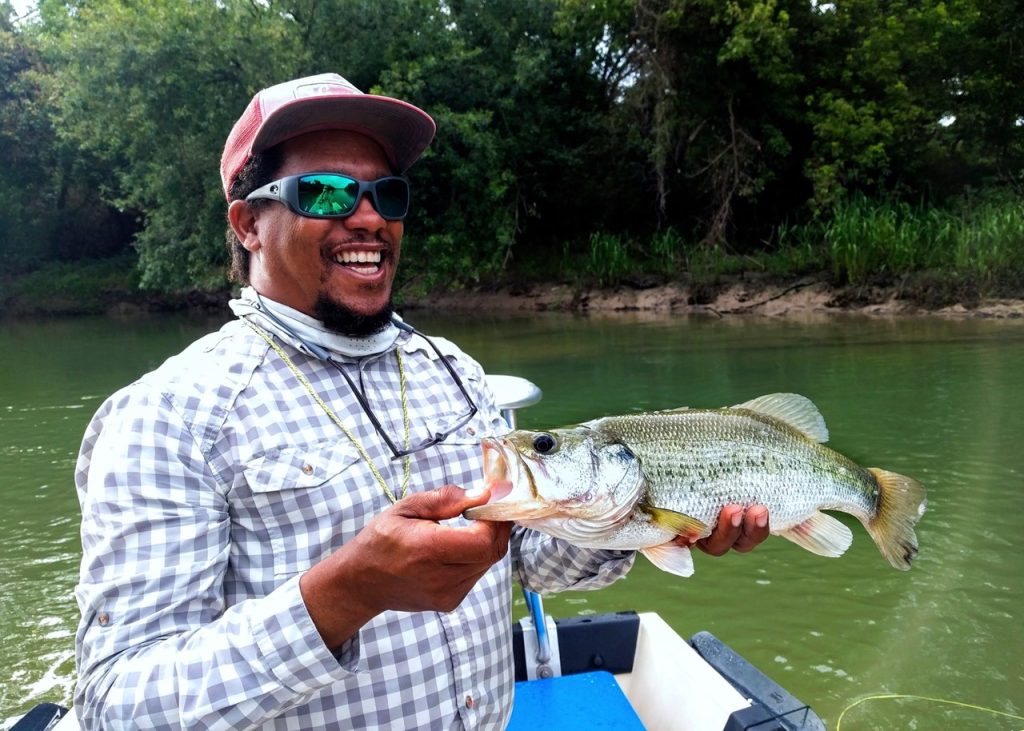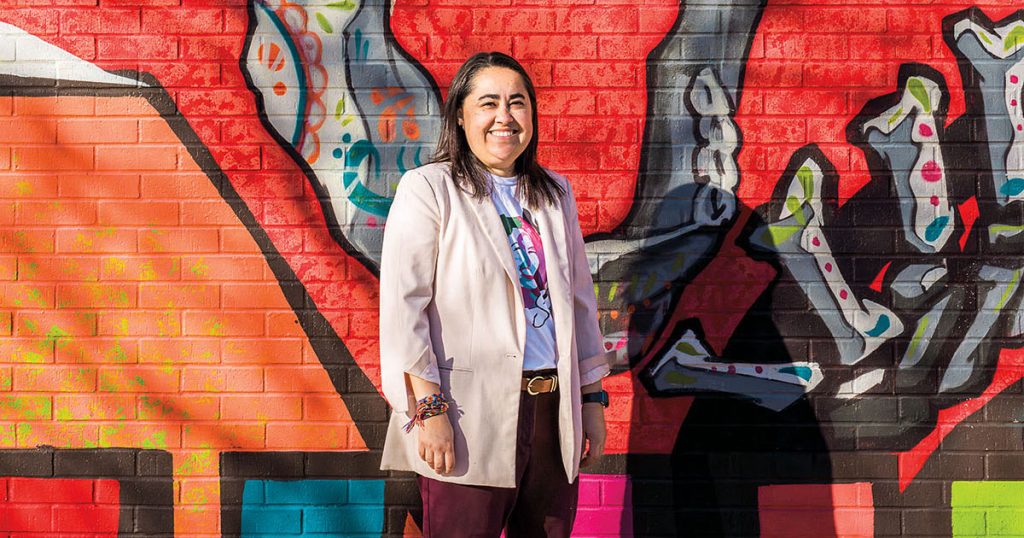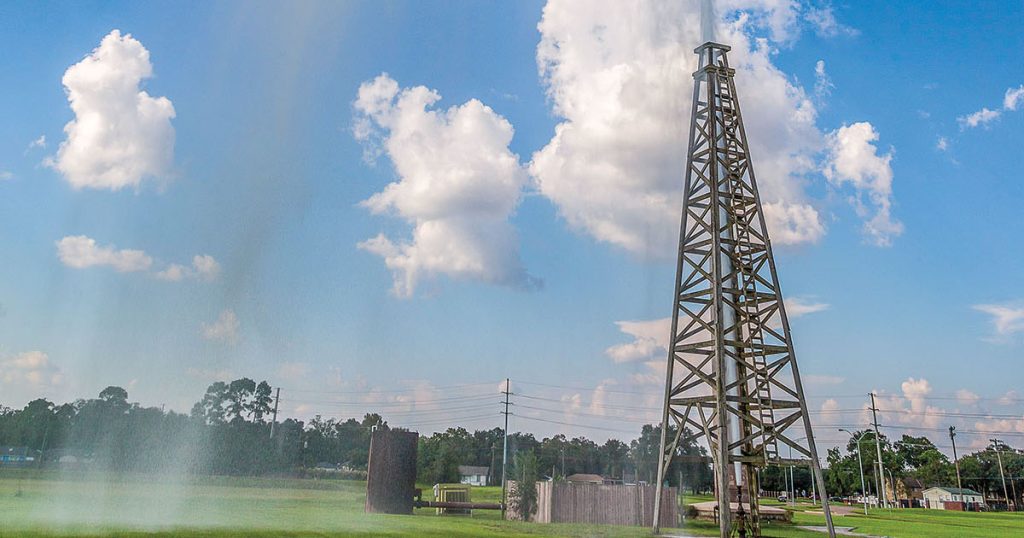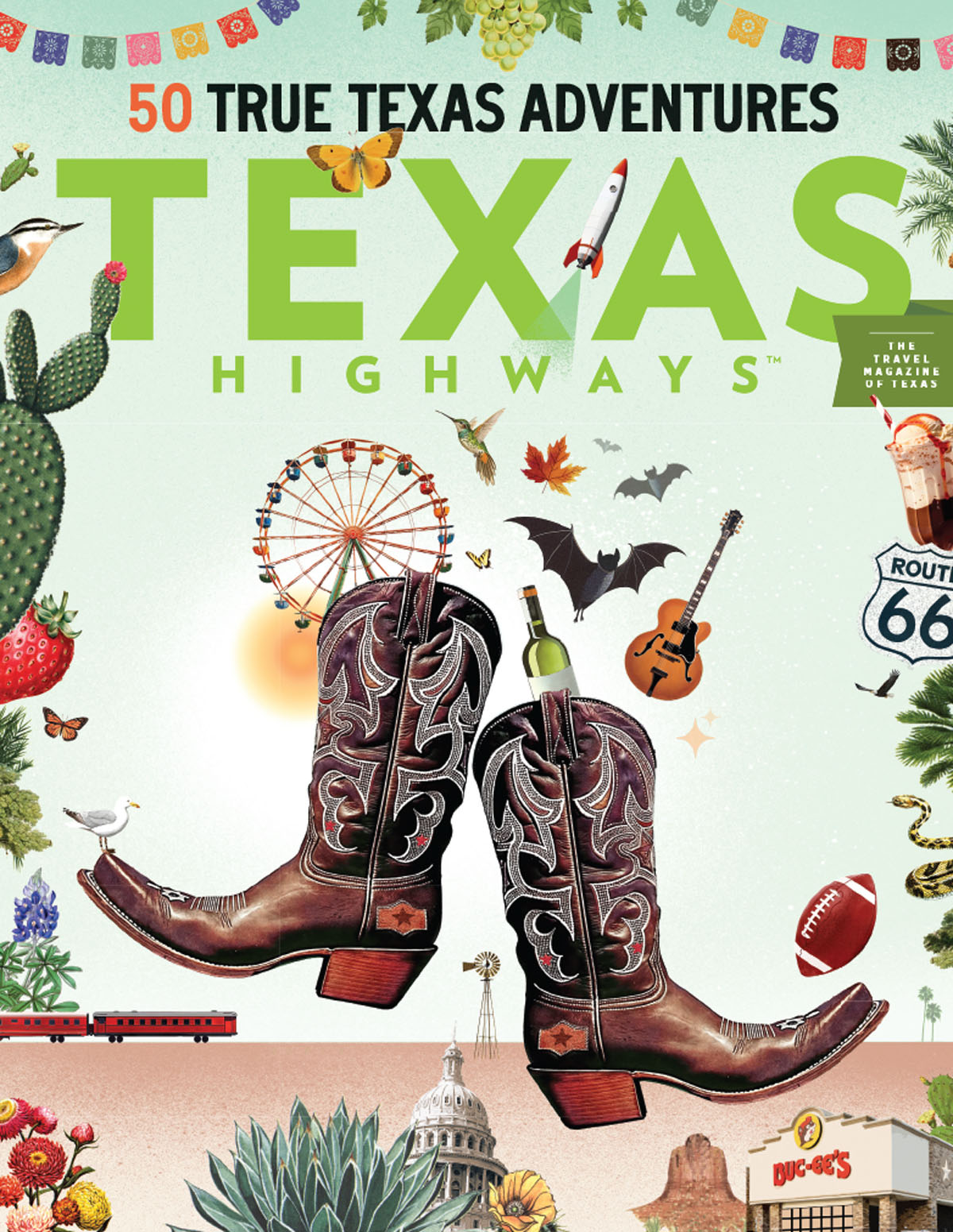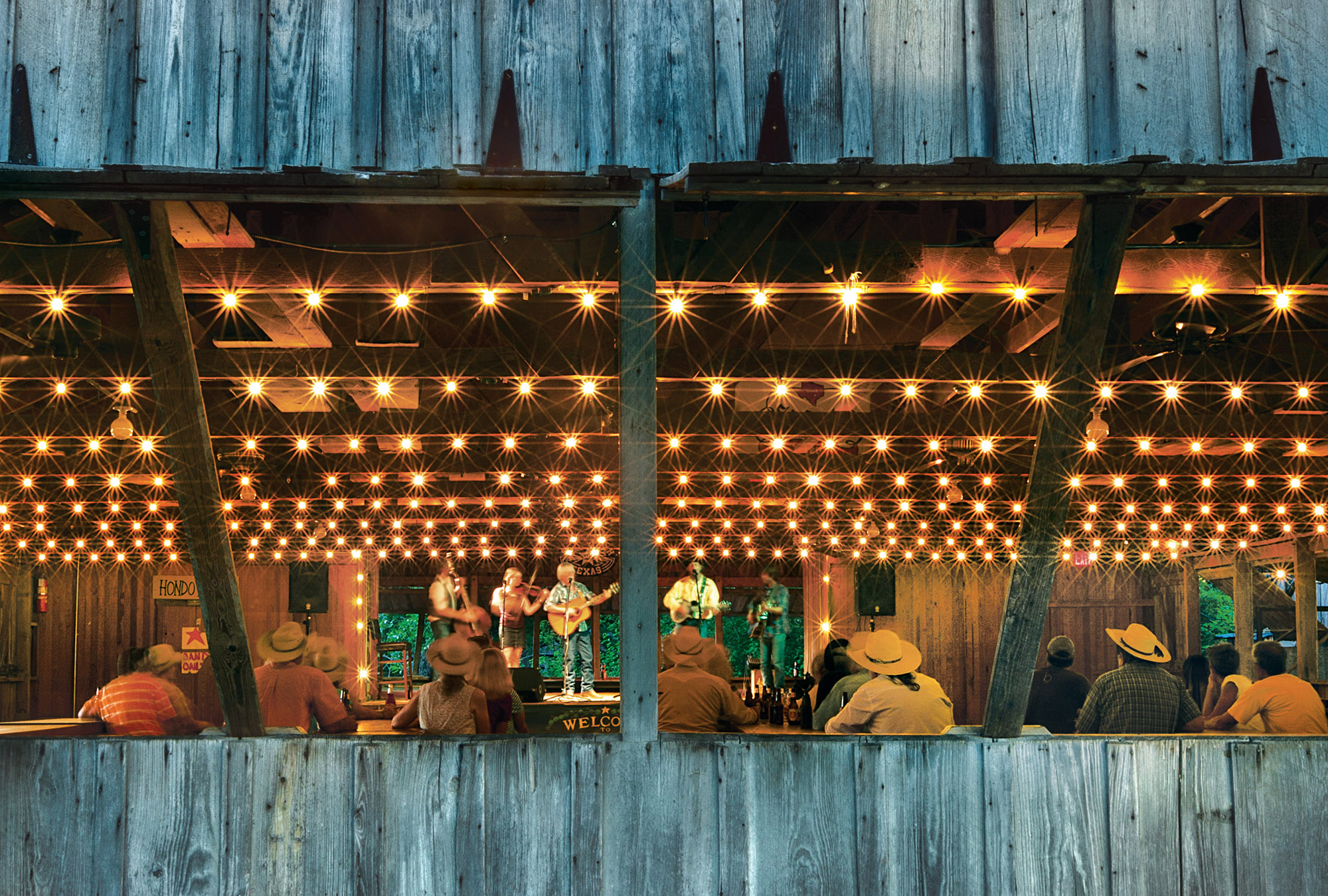
Luckenbach dance hall near Fredericksburg has been a must-visit historic live music venue since 1970. Photo by J. Griffis Smith.
It’s considered one of the albums every Texan should know by heart. But when it was released 50 years ago, ¡Viva Terlingua! was not a sales success, peaking at only No. 160 on the album charts. As the quintessential Hill Country party record, however, the album has never gotten old.
Jerry Jeff Walker, who passed away in October 2020 at age 78, was a frequent flyer by the seat of his pants, craving spontaneity over the sterility of recording studios. When the time came to record the follow-up to his self-titled 1972 major label debut on MCA, he and manager/producer Michael Brovsky hired New Jersey-based mobile recording unit Dale Ashby and Father to set up outside the dance hall at Luckenbach for a week of recording in August 1973.
The result was the no-frills masterpiece ¡Viva Terlingua!, a black box recording of what was going down when “outlaw country” was the rage, and Austin was the center of a new musical lifestyle movement. Michael Martin Murphey gave it a name in early ’73 with his Cosmic Cowboy Souvenir, but Walker gave the scene a sound and an attitude—frisky and organic—using the same band as Murphey: Bob Livingston on bass, Gary P. Nunn on keyboards, Craig Hillis on guitar, Mike McGeary on drums, and Herb Steiner on pedal steel. Also, Sweet Mary Hattersley was brought in to play fiddle and Mickey Raphael was on the harmonica.
¡Viva Terlingua was “the best record anyone in Texas will ever make,” wrote Austin American-Statesman music critic Joe Gracey, who was also a disc jockey at pioneering progressive country station KOKE-FM, when the album was released, just three months after it was recorded.
Fifty years later, ¡Viva Terlingua! continues to inspire new generations of singer-songwriters and producers. “That was my idea of how a record should sound,” says musician Bruce Robison, who produced Charley Crockett’s 2022 breakout The Man from Waco in similarly direct and unvarnished fashion. “Terlingua just captured what seemed like the crazy Texas ’70s in a way that was beyond real. It was more like a John Ford Western—better than the truth.” Other artists influenced by the album include Robert Earl Keen, Pat Green, Todd Snider, and rising star Jaimee Harris.
“The reason I knew about Guy Clark, Ray Wylie Hubbard, and Gary P. Nunn at a young age is because my dad was turned on to those songs and songwriters via ¡Viva Terlingua!,” says the Waco-raised Harris, who now lives in Nashville. “That had a massive influence on my songwriting.”
Bringing the recording equipment to Luckenbach—the former German Texans/Comanche trading post 10 miles from Fredericksburg—forged a connection to the history and culture of Texas that made the project more authentic.
Bought by rancher/philosopher Hondo Crouch for $30,000 in 1970, Luckenbach had been Walker’s favorite escape since moving to Texas from Florida in 1971. Virtuoso storyteller Crouch became a father figure to Jerry Jeff, who felt free to create magic from that good, thin air in the wooden hamlet “where everybody is somebody,” as the popular bumper sticker said.
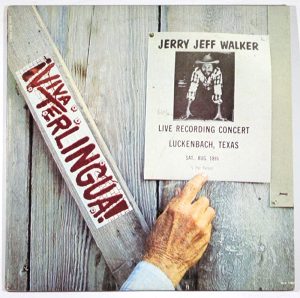
Jerry Jeff Walker’s ¡Viva Terlingua! album cover with Luckenbach owner Honda Crouch pointing at the flyer. Photo courtesy UMG/MCA, Nashville.
Walker brought only two finished songs, his “Little Bird” and Guy Clark’s “Desperados Waiting for a Train,” to the sessions, with the rest of the album coming together on the fly. That MCA president Mike Maitland was uneasy about financing such a “let’s see what happens” project was addressed in opening track “Gettin’ By,” when Walker sang, “Ah, Mike, don’t you worry, something’s bound to come out.”
The musicians, not yet called the Lost Gonzo Band, often worked out their parts in spirited afternoon jams, with the late-arriving Walker announcing, “Let’s cut it!” when it felt right. Well-intended flubs were left in the mix. The only mistake would’ve been not playing from the heart.
The entirety of ¡Viva Terlingua! was recorded live, with bales of sound-cushioning hay the only audience the first five days. Saturday night called for the energy of a crowd, and the place packed out at $1 a ticket. Audience interaction was one of the things that set the cosmic cowboys apart from the Nashville mainstream, but the crowd of 300 was over the top at the album’s live taping.
Townsend Miller, covering the Saturday night concert for the Austin American-Statesman, wrote that he’d never seen a crowd more “boisterously enthusiastic,” but wondered if producer Michael Brovsky could get any useable tape from the pandemonium.
Oh, he got tape!
Of the album’s nine tracks, two were recorded with an audience—Ray Wylie Hubbard’s “Up Against the Wall, Redneck Mother” and Gary P. Nunn’s “London Homesick Blues”—and remain enduring warhorses of Texas country. But the record also contains more subtle Jerry Jeff classics like “Little Bird,” “Sangria Wine,” and the aforementioned “Gettin’ By,” Walker’s customary concert opener from then on.
Inserting six minutes of poignancy to the Hill Country romp was “Wheel,” which considers the unpredictability of life and the inevitability of death through a tragic memory, the death of his grandfather when a tractor fell on him. “The rollin’ wheels, rollin’ on / Takin’ back all that they gave / Takin’ us all on our way,” Walker sings, wearily.
¡Viva Terlingua! ends in unbridled jubilation, with everyone in the joint singing “I wanna go home with the armadillo” at the top of their lungs. “London Homesick Blues,” the classic “missing Texas” song which served as the Austin City Limits theme for 28 years, had never been played live before Aug. 18, 1973. “Hey, Gary, why don’t you sing that song you played us under the tree this afternoon?” Walker asked Nunn late in the show. The band had not rehearsed “London Homesick,” but it was an easy one to pick up, and they nailed it on first take, the audience lustily singing along to a song they were hearing for the first time. Hold on! Brovsky came out of the control room with bad news—the tape ran out halfway through the song, and so they’d have to do it again.
“I’ve gotta put myself back in that place again,” said Nunn of the headspace that guided his impromptu lead vocal to delirium. But the second take was even wilder. Those present could hardly wait until November when the album came out to put them back in that place.
Why was it not called Viva Luckenbach? Too obvious. Photographer Jim McGuire took a picture of Hondo Crouch pointing to the humble flyer that brought the crowd, and Jerry Jeff declared, “That’s the cover!” Stuck on the wall next to the flyer was the bumper sticker from a spiritual sister ghost town 420 miles away that said ¡Viva Terlingua!
Recorded as if the music industry didn’t exist, it’s an album that makes you feel like you were there even if you weren’t, and you can’t get that in a studio recording.
